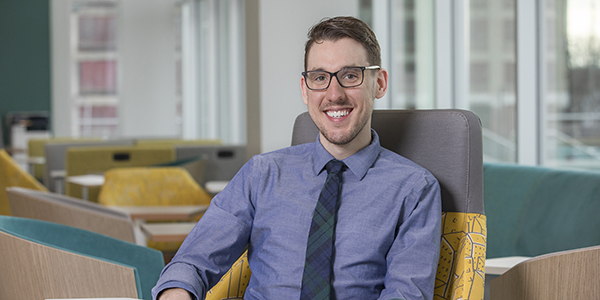Binghamton University certified as Opioid Overdose Prevention site
Campus is the first university to achieve certification for the program

Binghamton University was recently certified as an Opioid Overdose Prevention Program site by the New York State Department of Health — the first such university to achieve the certification.
The designation allows the campus to distribute Naloxone, commonly known as Narcan™, free of charge to non-medical individuals who have received training to use it.
Bennett Doughty, a clinical assistant professor of pharmacy practice at Binghamton’s School of Pharmacy and Pharmaceutical Sciences, worked with Richard Moose, medical director of the Decker Student Health Services Center, to develop the campus program. Sarah Young, assistant professor of social work in the College of Community and Public Affairs, will work with him on evaluating the program’s impact.
Doughty, whose research interests include patient engagement in substance abuse treatment, has been looking for ways to better engage and help those with opioid use disorder and found the opportunity through research into ways to expand the use of Naloxone in our area. He called the New York state program, “an amazing funding opportunity.” (Each kit costs $75.)
“There are minimal states that fund Naloxone in the country,” he said. “And, to my knowledge, no public universities are recognized as sites that do this, except perhaps through their police agencies, but we are certified as an institution.
“The program will not only provide Naloxone, the opioid overdose reversal agent, but will also help in other ways,” said Doughty, who will study how successful, and useful, the program is when delivered by non-medical individuals. “This program will also help reduce the stigma of opioid use disorders on campus as well as back in the home communities of many of our students.
“These disease states are so stigmatized — starting with the mental health discipline in general. Going beyond that, the stigma grows when you talk about substance use disorders – so much so that some individuals make statements such as ‘It’s the individual’s fault,’” Doughty said. “No one chooses to have a substance use disorder and endure the difficulties this disease state brings onto a person — a substance use disorder is just as much a choice as other chronic disease states are to patients. Due to this stigma, patients sometimes do not receive the treatment they desperately need. It’s my goal to educate the community and medical providers alike to combat these views and deliver the appropriate care.”
The first training events conducted by the Binghamton University Opioid Overdose Prevention Program will be geared toward Residential Life as it has “the most contact with our students, faculty and staff on campus.” Trainings conducted up to this point haven’t targeted non-medical individuals, Doughty said. “The knowledge, attitudes and views communicated through overdose responder trainings may be more meaningful when they are catered to a community member’s perspective versus that of a medical provider.”
Thus, along with administering the training, Doughty hopes to collect data to showcase the potential impact here at Binghamton University. Along with Young and Willie Eggleston, clinical assistant professor of pharmacy practice, Doughty hopes to develop and assess a new method of opioid overdose training.
The initiative will be two-fold, Doughty added. “We will begin with curriculum development with the help of community members versus just medical providers — again to capture this non-medical viewpoint that is often not sought in the hopes of developing a more comprehensive program.”
Doughty will use a series of surveys over time to evaluate the program’s success. Along with simulation responses, he plans to use the Opioid Overdose Knowledge Scale, a 14-item scale that assesses the individual’s overall knowledge of how to respond to an overdose, and the Opioid Overdose Attitude Scale, a 28-item scale that assesses the overall comfort level of responding to an overdose.
“This is not a mandatory training for our RAs, and not a job expectation,” said Amy Pollock Drake, associate director of staff development for Residential Life. “But I think a lot of our RAs will be interested.
“Nationally, opioid use on college campuses is low, but Broome County has the highest overdose rates in the state,” Pollock Drake said, so the benefits of training on campus will spread to other communities. “We’re going to develop the training in a way that will be helpful and meaningful to our students, and once they are trained, they can take it back to their communities.”
Pollock Drake noted that Harpur’s Ferry, the University’s student-run ambulance service, already carries Narcan, and that there is no downside to giving it to someone. In addition to being a safe treatment, anyone who delivers Naloxone is covered by the state’s Good Samaritan Law. “There is no risk there,” she said.
“But the education and training that will take place on campus will spread. There is some stigma and we’ll want to talk about how to manage that in the training, but this is a good opportunity to talk about why this matters,” Pollock Drake said. “If we dug a bit, we would find that many have been touched by opioids in some way, so it’s not as far off as it feels.”
Doughty hopes the program becomes a model that other schools will follow and perhaps someday expand the community-oriented training beyond campus. “The more resources and support we have behind fighting this epidemic, the more we will be able to decrease stigma, mortality and morbidity.”
